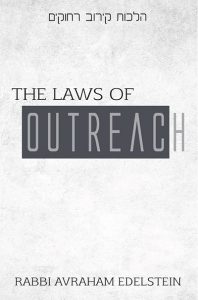
CHAPTER I: THE MITZVOS OF KIRUV
There are no special mitzvos of outreach. All of the mitzvos that relate to outreach are simply extensions of the concern that we must have for the spiritual well-being of our fellow Jew in general, whether or not he is observant. There are numerous Torah-based and rabbinically mandated mitzvos that have an impact on kiruv endeavors. Engaging in outreach can be associated with nineteen mitzvos. (Two of these nineteen, arvus and לה’ לעשות עת, are not included among the 613 mitzvos.) In addition, a person who fails to help his neighbor spiritually incurs a curse. Many of these mitzvos take precedence over performing other mitzvos, such as fulfilling the mitzvah of arba minim or lighting Chanukah neiros.
A. MITZVOS THAT MAY BE FULFILLED WITH OUTREACH
The nineteen mitzvos related to being a spiritual guide encompass all of the 613 mitzvos, for several of these mitzvos relate to all of the mitzvos. For example, the mitzvah of tochachah is associated with every mitzvah, for one has to reprove someone regarding any one of the 613
mitzvos that he may have violated. Moreover, every undertaking can be judged by whether it is an act of kiddush Hashem or not, and therefore each one of these mitzvos is potentially an act of kiddush Hashem. The intention in this chapter is not to deal with each mitzvah comprehensively,
but only those aspects of each mitzvah that are relevant to kiruv rechokim.
We also have separate, in-depth chapters on several of these mitzvos. In those instances, we have only provided the briefest of introductions to each of these mitzvos within this chapter.
The Re’em categorizes all of these commandments as mitzvos that bring our fellow Jew under the wings of the Shechinah. He writes that there can be no mitzvah greater than that. This often means that it is necessary for a person to sacrifice some of his own personal spiritual growth for the sake of the growth of others.
Rav Isser Zalman Meltzer expounded on how the obligation of kiruv used to be reserved for the great scholars but that, already in his day, the mitzvah of loving Hashem required this of everyone.
The mitzvos that will be discussed in this chapter are:
- The Mitzvah of Torah Study
- Constructive Criticism
- Not to Bear the Sins of Others
- Saving a Life
- Returning a Lost Object
- Charity
- Love Your Neighbor Like Yourself
- Emulating Hashem
- Do Not Hate
- Do Not Place a Stumbling Block before the Blind
- Sanctifying Hashem’s Name
- Do Not Desecrate Hashem’s Name
- Loving Hashem
- Time to do for Hashem
- Mutual Responsibility
- Teshuva
- Emulating Our Forefathers
- Do Not Flatter a Sinner
- Not to Forget the Sinai Experience
Please click here to download Chapter I: The Mitzvos of Kiruv from The Laws of Outreach.
Please click here to purchase a copy.
____________________________________
OlamiResources.com is honored to present free to the Olami Community and beyond, Rabbi Avraham Edelstein’s new landmark sefer, The Laws of Outreach. We are featuring the sefer to the readership of OlamiResources.com in downloadable installments over the next few months. We are greatly appreciative that Rabbi Edelstein has kindly offered to share this important publication, including extensive Hebrew footnotes, with rabbis, educators and mekarvim worldwide. This installment is Chapter I: The Mitzvos of Kiruv. Please click here to purchase a copy.



















